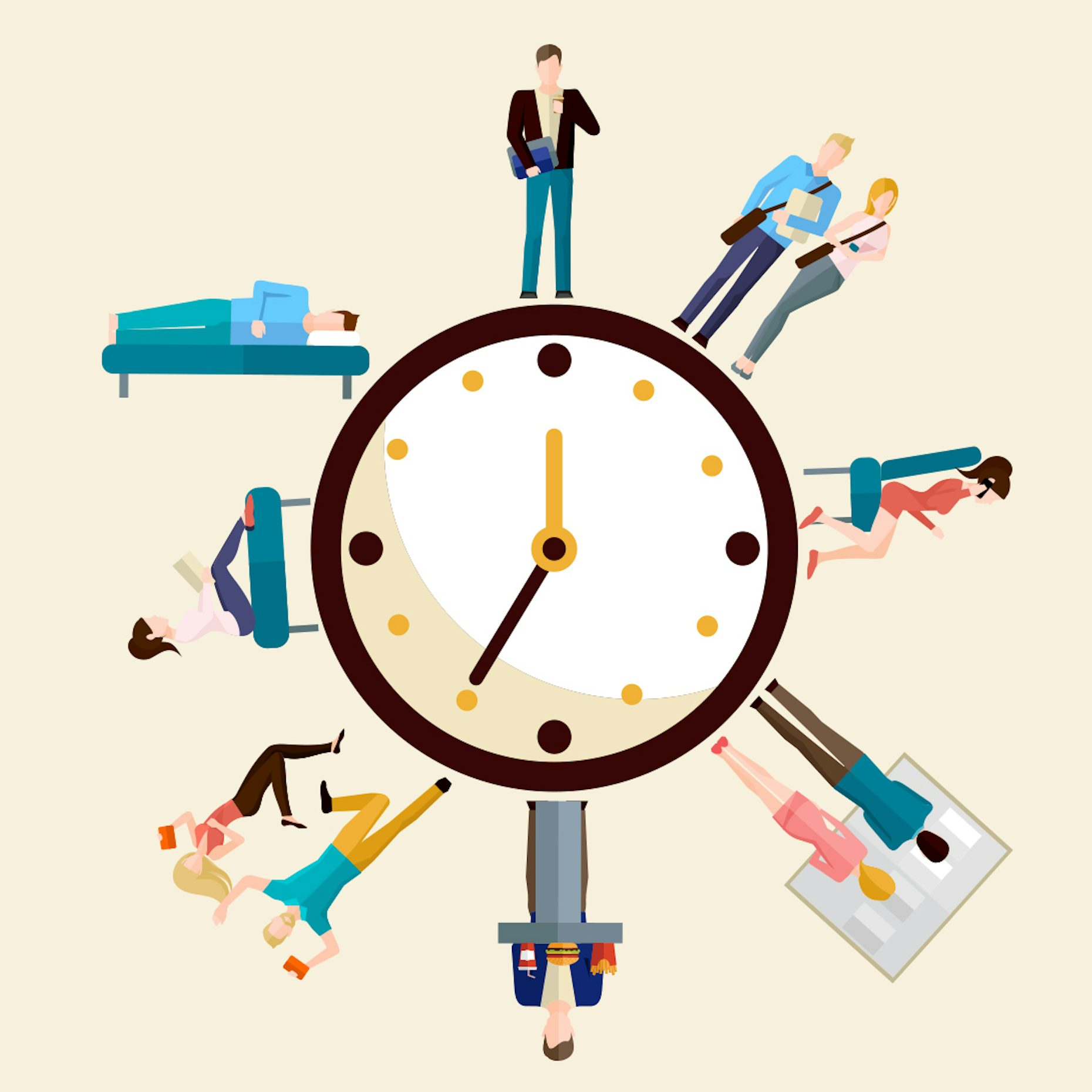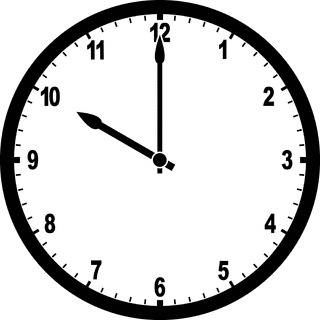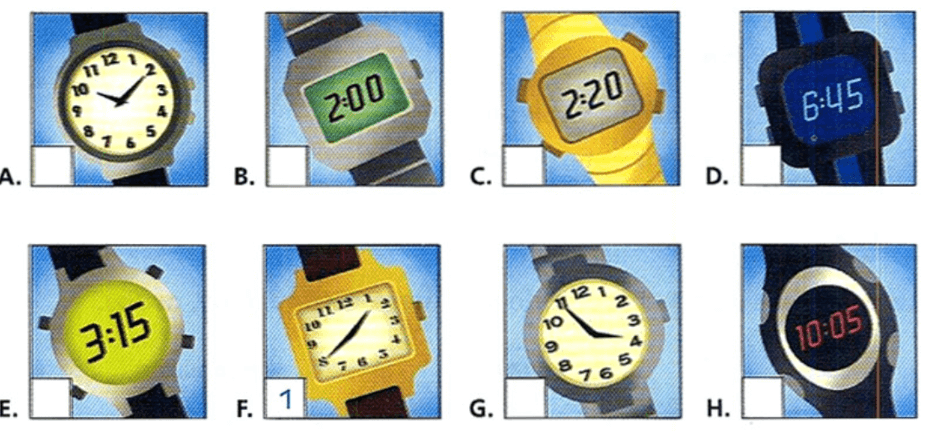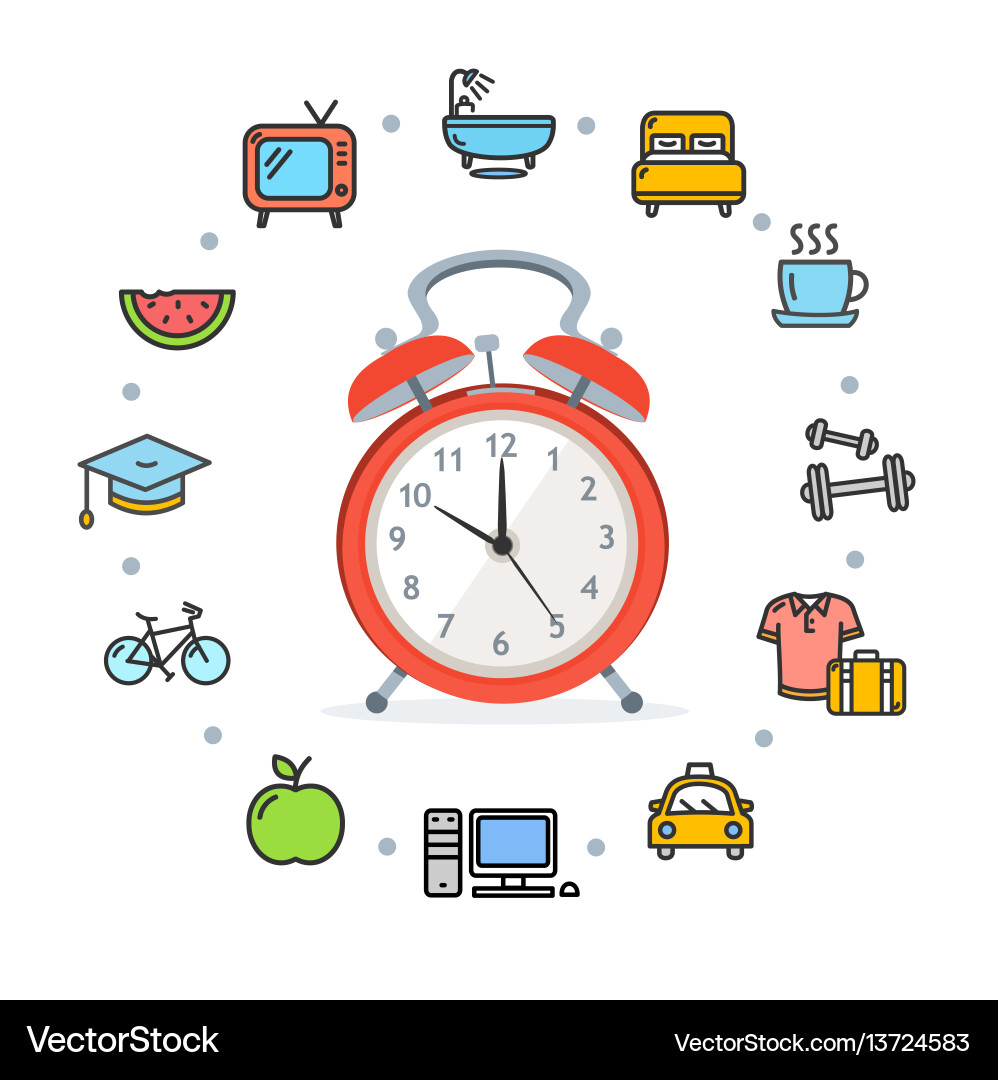Time and routine
Learn how to describe your daily routines and tell time using simple phrases and vocabulary.

Part 1
Warm-up
Answer the questions
What time do you usually wake up in the morning?
What is your favorite time of the day and why?
Part 2
Telling the time
Teacher guides the student how to tell the time.
1) Say the hour first and then the minutes. (Hour + Minutes)
- 6:25 – It’s six twenty-five
- 9:11 – It’s nine eleven
2) Say the minutes first and then the hour. (Minutes + PAST / TO + Hour)
- For minutes 1-30 we use PAST after the minutes.
- For minutes 31-59 we use TO after the minutes.
- 11:20 – It’s twenty past eleven
- 4:18 – It’s eighteen past four
- 8:51 – It’s nine to nine
- 2:59 – It’s one to three
- When it is 15 minutes past the hour we normally say: (a) quarter past
- 7:15 – It’s (a) quarter past seven
When it is 15 minutes before the hour we normally say: a quarter to - 12:45 – It’s (a) quarter to one
When it is 30 minutes past the hour we normally say: half past - 3:30 – It’s half past three (but we can also say three-thirty)
Part 3
Vocabulary
Read the word, its’ meaning, and the examples
Then make up your own sentences using the word.
Student can skip the words they already know.
O'clock
/əˈklɑk/

We use o'clock when there are NO minutes.
- 10:00 - It's ten o'clock
- 5:00 - It's five o'clock
- 1:00 - It's one o'clock
12:00
/twɛlv əˈklɑk/

For 12:00 there are three expressions in English.
- twelve o'clock
- midday = noon (12:00 p.m)
- Midnight ( 12:00 a.m)
How to ask and answer for the time
- What time is it?
- What is the time?
=> It’s _______
Example: It’s 10:00 AM
Mini exercise:
Look at the picture on the right.
Say the time on each clock.

alarm clock
/əˈlɑrm klɑk/

Alarm clock is a device that makes a loud noise or plays music at a set time to wake someone up from sleep.
I set my alarm clock for 7 a.m. so I can wake up in time for work.
routine
/ruːˈtiːn/

A routine is something you do often. It can a thing you do every day, every week, every month, or even every year.
She starts her morning routine with yoga and coffee.
I have a bedtime routine. I brush my teeth and read a story before going to sleep.
Common daily routine:
- Wake up
- Turn off the alarm
- Brush my teeth
- Take a shower
- Get dressed
- Comb my hair
- Eat/Have breakfast
- Go to work or school
- Have lunch
- Do homework or work tasks
- Exercise or engage in physical activity
- Have dinner
- Relax or unwind
- Prepare for bed
- Brush my teeth again
- Get ready for sleep
- Go to bed
Make up your own sentences using the words.
Part 4
Reading
Read the article and answer questions.
Teacher helps student correct their pronunciation.
My daily routine
Every day, I follow a routine to stay organized. In the morning, when my alarm clock wakes me up, the first thing I do is brush my teeth. Then, I freshen up by taking a shower and getting dressed. I make sure to have a good breakfast before going to work or school. During lunchtime, I take a break to enjoy a meal. In the afternoons, I focus on finishing my work tasks to make sure I stay responsible and get things done. I also make sure to exercise and stay active. In the evenings, I have dinner and relax by doing activities that make me happy. Before bed, I make sure to brush my teeth again and prepare myself for a restful sleep.
Choose the words below to fill in the blank
| exercise | brush my teeth | taking a shower |
| have dinner | getting dressed | work tasks |
| organized | wakes me up | good breakfast |
Every day, I follow a routine to stay _____. In the morning, when my alarm clock _____, the first thing I do is brush my teeth. Then, I freshen up by _____ and _____. I make sure to have a _____ before going to work or school. During lunchtime, I take a break to enjoy a meal. In the afternoons, I focus on finishing my _____ to make sure I stay responsible and get things done. I also make sure to _____ and stay active. In the evenings, I ____ and relax by doing activities that make me happy. Before bed, I make sure to _____ again and prepare myself for a restful sleep.
Part 5
Listening 1
What time does each person get up and go to bed? Listen and write the times.
Click to play the Audio
| gets up | goes to bed | |
| 1. Sandra | ||
| 2. John | ||
| 3. Sam | ||
| 4. Grace | ||
| 5. Mia | ||
| 6. James |
Answers
- 5:00, 8:30
- 6:15, 12:00
- 9:30, 3:00
- 7:45, 1:00
- 6:00, 10:00
- 4:00, 8:00
Part 5
Listening 2
Listen again. Circle the correct statement.
Click to play the Audio
- Sandra studies before school.
- Sandra studies at night.
- John looks happy.
- John looks tired.
- Sam usually goes running in the morning.
- Sam usually sleeps late in the morning.
- Grace is a night person.
- Grace is a morning person.
- Mia gets up early to go to work.
- Mia gets up early to take a walk.
- James likes his new job.
- James likes working at night.
Answers
1 a
2 b
3 b
4 a
5 b
6 a
Transcript
1.
A: Hey, Sandra, do you want to go to the movies tonight?
B: Maybe… what time?
A: How about the nine fifteen show?
B: Oh, that’s too late for me… I usually go to bed at eight thirty.
A: So early?
B: Yeah… I have to get up at five a.m. to study before school.
A: Five a.m.? Why don’t you study at night?
B: I don’t like to stay up late. I’m a morning person.
2.
A: You look tired, John.
B: Yeah, well. I’m always tired.
A: Really? What time do you go to bed?
B: Usually around midnight. I like to stay up late. But I have to get up at six fifteen to go to work.
3.
A: Do you want to go running tomorrow morning, Sam?
B: It depends… what time?
A: How about six o’clock?
B: Six o’clock? I don’t get up until around nine thirty!
A: Wow, you get a lot of sleep!
B: Not really… I usually stay up until about three in the morning.
4.
A: Are you a morning person or a night person, Grace?
B: Oh, definitely a night person.
A: Really?
B: Yeah, I can’t fall asleep before midnight. I usually go to bed around one a.m.
A: Huh. Do you sleep late in the morning?
B: Not really. I usually get up at a quarter to eight.
5.
A: Did you watch the eleven o’clock news last night, Mia?
B: No… I was asleep. I usually go to bed around ten.
A: Ten o’clock? That’s pretty early, isn’t it?
B: Yeah, well, I’d like to stay up later… but I have to get up at six a.m. to go to work.
6.
A: Hi, James, what’s new?
B: Well, I got a new job a few weeks ago.
A: Really? Congratulations! How do you like it?
B: Well, it’s great, except for the hours. I work the night shift.
A: Oh, no! When do you sleep?
B: Well, I go to bed at eight in the morning. I sleep all day, and get up at four in the afternoon.
Part 6
Discussion
Let’s use the vocabulary you’ve learned during the lesson and talk about the following topics/questions freely!
Teacher helps student expand and correct the answers
What time do you usually wake up in the morning?
Do you have breakfast before going to work/school?
How do you spend your free time during the day?
Do you feel more productive in the morning or in the evening?
Are you usually early, late, or on time to class/ work?
What time do you usually go to bed at night?
Do you prefer to have a strict schedule or do you like having more flexibility in your day?
Do you think having a routine is important? Why or why not?
Review
Let’s review the lesson with teacher
Vocabulary about time & routine
How to ask & answer for the time
Discussing about your routine
See you next lesson
Homework
Do homework
Write a short paragraph describing your typical daily routine
Practice & record your voice to send to teacher for checking pronunciation

